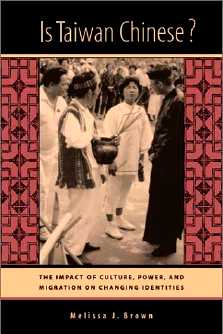|
Is Taiwan chinese ?
The impact of
culture, power, and migration on changing identities / Melissa J.
Brown. - Berkeley : University of California press, 2004. -
349 p. : ill. ; 23 cm. -
(Interdisciplinary studies of China, n° 2).
ISBN
0-520-23181-3
|
DESCRIPTION
: The « one China » policy
officially supported by the
People's Republic of China, the United States, and other countries
asserts that there is one China and Taiwan is part of it.
The
debate over whether the people of Taiwan are Chinese or independently
Taiwanese is, Melissa J. Brown argues, a matter of identity :
Han
ethnic identity, Chinese national identity, and the relationship of
both of these to the new Taiwanese identity forged in the 1990s.
In
a unique comparison of ethnographic and historical case studies drawn
from both Taiwan and China, Brown's book shows how identity is shaped
by social experience — not culture and ancestry, as
is
commonly claimed in political rhetoric.
| ❙ | Melissa J. Brown 鮑梅立 is Assistant Professor of Anthropolocical Sciences at Stanford University. She is the editor of Negociating Ethnicities in China and Taiwan (1996). |
|
| CONTENTS |
Preface
- What's
in a Name ? Culture, Identity, and the
« Taiwan Problem »
- Where
Did the Aborigines Go ? Reinstating Plains Aborigines in
Taiwan's History
- « We
Savages Didn't Bind Feet » : Culture,
Colonial Intervention, and Long-Route Identity Change
- « Having
a Wife is Better than Having a God » :
Ancestry, Governmental Power, and Short-Route Identity Change
- « They
Came With Their Hands Tied Behind Their
Backs » : Forced Migrations, Identity
Changes, and State Classification in Hubei
- Theory
and Politics : Understanding Choices at the Border to Han
Notes
References
Character List
Index
|
|
| COMPLÉMENT
BIBLIOGRAPHIQUE |
- Melissa J.
Brown (ed.), « Negotiating
ethnicities in China and Taiwan »
Berkeley : Institute
of East Asian studies, University of California (China research monograph, 46), 1996
|
Taiwan sur le site des
littératures insulaires
En l'absence d'une sélection suffisamment
développée, la liste qui suit regroupe des
références dispersées sur l'ensemble
du
site ;
y figurent des ouvrages de fiction, des récits de
voyage, des essais et études. |
- Elliot Ackerman and James Stavridis, « 2034 : a novel of the next world war », New York : Penguin press, 2021
- Véronique
Arnaud, « Ancêtres extraordinaires,
phénomènes et rites (Botel Tobago,
Taiwan) »
in Imagi-Mer :
créations fantastiques, créations mythiques,
éd. par Aliette Geistdoerfer, Jacques Ivanoff et Isabelle
Leblic, Paris : CETMA, 2002
- Maurice Auguste Beniowski, « Mémoires et voyages »,
Paris : Phébus, 2010
- Jean-Pierre Cabestan, « Le système politique de
Taïwan : la politique en République de
Chine aujourd'hui », Paris :
Presses universitaires de France, 1999
- Christine Chaigne, Catherine Paix et Chantal Zheng
(éd.), « Taïwan :
enquête sur une identité »
Paris : Karthala, 2000
- Gwennaël
Gaffric (éd. et trad.),
« Taipei : histoires au
coin de la rue », Paris :
L'Asiathèque, 2017
- Hwang Sok-yong, « Shim Chong, fille vendue »,
Paris : Zulma, 2009
- Gilles Laurendon, « Les buveurs d'infini »,
Paris : Belfond, 2003
- Qiu Miaojin, « Les carnets du crocodile », Paris : Noir sur blanc, 2021
- Syaman
Rapongan, « Les yeux de l'océan — Mata nu
Wawa », Paris : L'Asiathèque, 2022
- Shih Shu-Ching, « Elle s'appelle Papillon »,
Paris : L'Herne, 2004
- Scott Simon, « Sadyaq Balae !
L'autochtonie formosane dans tous ses états »,
Québec : Presses de l'université Laval,
2012
- Guo Songfen, « Récit de lune »,
Paris : Zulma, 2007
- Wang Wenxing, « La fête de la
déesse Matsu »,
Cadeilhan : Zulma, 2004
- Wu Ming-yi,
« L'homme
aux yeux à facettes »,
Paris : Stock (La Cosmopolite), 2014
- Wu Ming-yi, « Le magicien sur la passerelle
», Paris : L'Asiathèque, 2017
|
|
|
| mise-à-jour : 10 octobre 2022 |

|
|
|
|